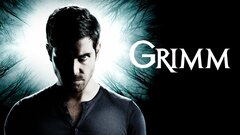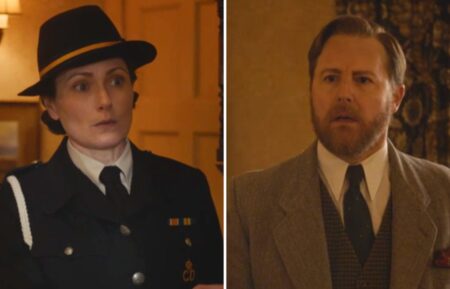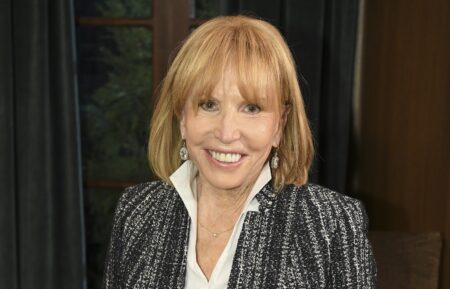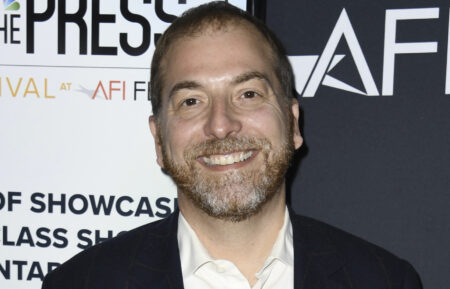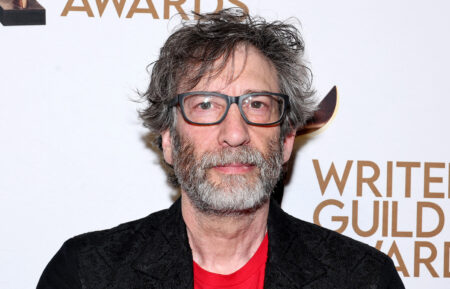Ask Matt: Wolf Hall vs. Tudors, Glee Finale, The Voice, Grimm, and More

Welcome to the weekly Q&A with TV critic (also known to some TV fans as their “TV therapist”) Matt Roush, who’ll address whatever you love, loathe, are confused or frustrated or thrilled by in today’s vast TV landscape. One caution: This is a spoiler-free zone. Don’t ask me what’s going to happen on a show. I prefer to find out along with everyone else. Please send your questions and comments to [email protected] and follow me on Twitter.

Question: I saw The Tudors and loved its trashy, sexy, yet somewhat accurate portrayal of King Henry, so with that fresh in my mind, is it worth it for me to see PBS’s Wolf Hall? — Pete
Matt Roush: Funny you should ask, because in my review of Wolf Hall (which will be posted later this week), I begin by noting, “Arrive at Wolf Hall expecting the second coming of The Tudors and you may be disappointed.” I continue by explaining that this splendid six-part Masterpiece event (premiering this Sunday, April 5) is “more about sinister politics than sexual pomp,” and what distinguishes this series from others telling this familiar story is the point of view (adapted from Hilary Mantel’s tremendous novels) from which it’s told: that of King Henry’s most trusted adviser, Thomas Cromwell, played by the brilliant stage actor Mark Rylance (to the fiery Henry of Homeland‘s Damian Lewis). I recommend Wolf Hall very highly, if only for the acting (including a memorable Jonathan Pryce as Cardinal Wolsey and Claire Foy as a very willful Anne), although the production values and writing are top-notch as well. But it may initially feel like slow going if you’re looking for torrid historical escapism. If that’s your thing, let me point you toward the return of Outlander on Starz this Saturday. That couldn’t be more steamy.
Question: Why did CBS shorten the CSI season this year and will it be back in the fall? — Alice
Matt Roush: The simplest answer to the first part of your question is a matter of inventory. With CSI: Cyber in the wings for midseason, as well as Battle Creek, CBS didn’t need a full season of episodes from the mothership to run through spring. (It could also be a function of cost, because long-running shows tend to carry a hefty price tag). No decision yet on its future, but I’d like to think with a franchise that has been this important to the network’s fortunes, that when the time comes, CBS will give it a final season (even if shortened) to take a last victory lap instead of just ending it this abruptly.

Question: I know that Glee has a history for being very uneven (to say the least), including this final season, which I mostly enjoyed—except for how they handled Sue and her downfall. But I’m glad that they had a pretty good payoff with the two-hour finale. I especially enjoyed the first hour, which gave us a look back and let us appreciate just how far everyone has come since then. And I kind of get how they were focusing on the “true original” members of the club (i.e., those who were part of the first episode) in the final hour, but do you think they should have given some of the original characters (Quinn, Puck, Brittany, and Santana, especially) a glimpse into their futures as well? I get that it would have been difficult to fit even more “flash-forwards” into the hour (and Fox probably wasn’t going to agree to another half-hour or hour added on), but it would have been nice to see them in more than just glimpses during the final song. Even having them show up to watch the Tony Awards with the rest would have been better. (As a side note: I loved Rachel’s acceptance speech. It felt like a real acceptance speech and not something thought up by a show’s writer.) — Scott
Matt Roush: Uneven hardly begins to describe the Glee experience of the last few seasons. It never truly recovered from the debacle of the New York misadventures. I was appalled by the nonsensical first episodes of this season and bailed quickly, but like many (well, not that many), I came back for the finale and was happy to get at least that much closure. I agree that short-changing some of the original characters was unfortunate, but hardly out of character for this series.
Question: I just finished watching the Glee finale and enjoyed it. Like a lot of people, I was an avid Glee fan who drifted away at some point. Part of that was due to the show itself. But after Cory Monteith died, I just realized I couldn’t watch the show anymore. It was just too hard—not because he was so integral to the show, but because it was hard to enjoy singing-and-dancing show-choir stuff, knowing how much all the people who knew and loved him were hurting. And that leads me to my question: Do you think it’s possible for a show to be successful after the tragic death of one of its core actors/actresses? I can’t think of an example of one that did. Certainly, shows have survived after an actor’s death. But I’m not talking about “normal” deaths, due to illness or old age. I’m thinking of tragedies. I’m thinking of My Sister Sam, Suddenly Susan and NewsRadio. Do you have any examples of shows, particularly comedies, that were able to overcome a tragedy, even thrive? — Kirsten
Matt Roush: That’s an interesting perspective, and it’s probably true that Cory Montieth’s untimely death was a blow from which the show, already faltering creatively by that point, couldn’t ultimately recover. To your broader question, no example quickly leaps to mind—but my brain is pretty fogged from the volume of TV premiering this week, so I may be missing something obvious. (If you have examples, let me know by writing me at [email protected].) Probably one of the most significant sitcom characters to die unexpectedly, and be replaced successfully, was Coach (Nicholas Colasanto) on Cheers, whose passing led to Woody Harrelson joining the gang as Woody Boyd. That felt like a tragedy to me at the time, but I get your point that more shocking deaths (murder, suicide, overdose) of younger actors can truly rock an ensemble show’s world.
Question: I don’t understand the love for The Voice. While the judges can be great at times and have amazing chemistry, the format of the show seems to be seriously flawed. During most episodes, I sit there for two hours and watch maybe five performances. Additionally, the judges never tell contestants that they had a bad performance, even if it’s the worst thing in the world. Why is it such a big hit when the music seems to be playing second fiddle (pun intended) to the antics of the judges/contestants? — Eli

Matt Roush: Those antics, and the personalities of the coaches, are what’s driving The Voice‘s ratings (which are still robust by today’s standards, though I’d imagine not at their peak). But I’ve always felt the appeal of this particular competition show wanes after the period of team selection (the blind auditions and steals), when the celebrity coaches have too much stake in their teams’ individual and collective progress to be honest and truly critical. The stars in the chairs tend to overwhelm the emerging talent from start to finish—witness next Monday’s guest performance by Maroon 5—which may help explain why a true superstar has yet to emerge from this series.
Question: I was wondering how platforms like Netflix rate the success of a series, considering the traditional ratings system is not fitted for this paradigm. Is there a magic number of downloads? Many of the shows are released a whole season at a time, so do they follow viewership for each individual episode, or the whole shebang? Or even just one episode and consider that a countable viewer? It must be getting more difficult to judge what is a popular success! — Andrew
Matt Roush: It’s a mystery to everyone, because Netflix doesn’t release viewer data on individual series. Thankfully, I don’t report on or obsess about ratings, but it seems to me that because Netflix’s business (and those of other such services) is driven by subscriptions and level of engagement, their investment in original programming, with the binge-oriented scheduling strategy (recently adopted by Amazon), seems to be paying off, at least in terms of media and consumer buzz. (Anecdotal case in point: I’ve had several friends tell me how much they’re enjoying Unbreakable Kimmy Schmidt, which if it were airing weekly on NBC I bet would never be on their radar.) But what the metrics are of determining what’s a hit and (less frequently) what isn’t on these platforms is beyond me.

Question: What are your thoughts on Samaritan as a whole on Person of Interest? I find myself in a state of constant confusion, because this Machine is supposed to be much stronger. There has been more than one occasion when the team has made a mistake under Samaritan’s watch such as using a safe house that was under Harold’s old name, and that was well in the beginning of the season. It feels unbelievably padded to fill a 22-episode season and would have been better suited for a half-season scenario. I have seen ideas towards a subtle game by Samaritan where it slowly unravels the team’s personas and makes life difficult for them, and I feel that would have made for better intimidation, forcing the team into a situation they don’t want. Samaritan has access to lots of information, so why is it taking so long to finish off something that doesn’t seem like a threat, since all of the team’s plans have failed so far. — Odalys
Matt Roush: I’ve enjoyed much of this Samaritan season, at least up to the point when Shaw was removed from the equation. I won’t argue with your nitpicking, in part because I prefer not to overthink such things, and I agree that stretching this out for an entire season has resulted in some unfortunate padding. (Watching the show revert temporarily to classic follow-the-number form has been a bit frustrating.) But I do like watching our heroes try to follow their mission while staying off the Samaritan grid. And I’m hoping the season will end with a showdown between the Machines that will allow the series to reboot next season with some new menace to occupy the team’s time.
Question: I realize that happy storylines aren’t always the way to go, but seriously, does Grimm have to be, so, well, grim? Juliette a Hexenbiest? Ick. I hate this storyline. Her misery makes me cringe in all the worst ways. But Adalind frustrated and pregnant (again)? Love it. Her misery makes me laugh in all the best ways. Also, I’m loving Forever, and hope it gets the chance to stick around. I’m hoping the fact that it’s a quiet little show in a tough time slot helps improve the odds that ABC will just let it ride. (I always watch Forever first, and record Person of Interest for later viewing, even though it’s my favorite show currently on the air. I always want to re-watch POI, just to make sure I didn’t miss something crucial.) I love the humor in all of these shows, and appreciate that it serves as a counterpoint to the drama, but I get annoyed and frustrated when there’s too much stress, gloom and/or misery. — Anna
Matt Roush: The balance of light and dark in genre shows can be tricky to maintain, but I find myself losing interest if the stakes aren’t shown as high, which often means peril and suffering for characters we like. That comes with the territory. Concerning Forever: I suppose it has to considered “on the bubble” for now, especially as it comes from outside the ABC/Disney production factory, but I’m cautiously hopeful that this entertaining fantasy/mystery won’t be cut short. ABC could do much worse in that time period, and has. Letting it grow could pay eventual dividends, and besides, what an appealing cast.
Question: So happy I found your new home for Ask Matt. You are my “bible” for viewing new shows; our tastes are very similar. I am a TV junkie who appreciates well-done series’ intro credits, and there are many. Just a few off the top of my head over the years I’ve found extraordinary include: I Spy, The Avengers (Emma Peel years), The Adventures of Brisco County Jr., Tour of Duty, Veronica Mars, Crime Story (Season 1), all the Law & Orders & CSI‘s, Covert Affairs (the early years). Currently I think the best is Elementary (the long version). Do you appreciate a good show opening, and do you have any favorites? — Roger
Matt Roush: Well, thank you—and I’m a fan of the complete Elementary Rube Goldberg/mousetrap sequence as well. (I tend to pout a bit when it doesn’t air.) Being a child of the ’60s and ’70s, I grew up in a golden age of great title sequences, but two that stand out for me are the animated titles of The Wild Wild West (and how the panels would be replaced by freeze-framed cliffhanger moments at each act break) and the glorious “Love Is All Around” title sequence of The Mary Tyler Moore Show, with her iconic hat toss. Often imitated, never surpassed.
Question: Can you explain Disney Channel’s scheduling patterns? They aired a new episode of Girl Meets World last Friday (March 27) after airing the previous one on Feb. 6. Prior to that, it was on two weeks in a row in the beginning of January. I can honestly say that if my DVR hadn’t picked it up, I would not know that Girl Meets World was airing an episode and would have missed it. I don’t mind shows being put on hiatus in order to air originals in a consecutive block, but what is the point of giving us one episode at a time in random weeks? No air date was given for the next episode, either, so I guess it’s another slog until they decide to dole out the next one. The first part of the season, which aired last summer, was mostly consistent, so this one-episode-at-a-time thing seems to be fairly new. I much prefer that a show be on with at least a shred of consistency. I also get that I am not really the target audience for Disney Channel programming, and Girl Meets World is the only thing I watch, because as a ’90s kid I grew up on its predecessor. But still, how does this strategy work for Disney Channel? — Jake
Matt Roush: Can’t imagine, and this was news to me. (I’m also hardly the target audience, and even the original Boy Meets World was a bit past my regular “TGIF”-watching days.) The only conceivable justification is that for channels like Disney, repetition of formula TV (including family sitcoms and especially animated shows) isn’t always a negative. But to scatter original episodes so randomly in a show’s freshman season—four episodes total since January, it appears—is no one’s idea of effective programming.
That’s all for now. Please send your questions and comments to [email protected] or on Twitter.

